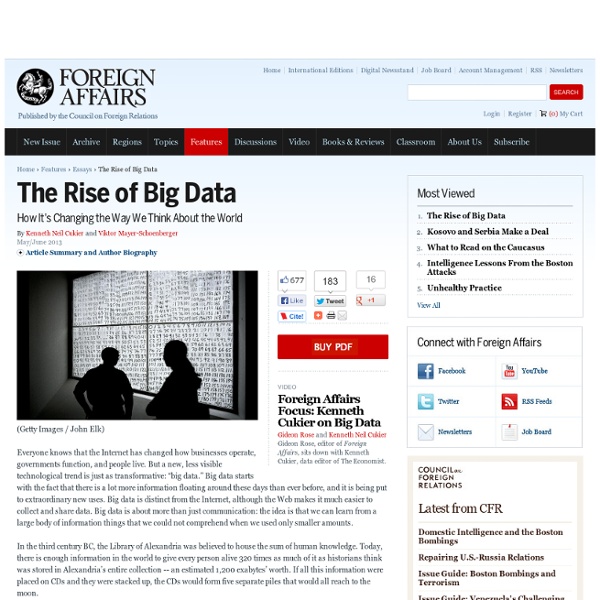The Rise of Big Data

Big Data, Social Media and the Long Tail of Public Policy
Preamble You may have noticed that I didn't publish last week; as a result this week's article is both weightier and lengthier. Accordingly I decided to experiment a bit by providing a TL;DR version of the article up front, namely: Public Engagement via Social Media + Big Data Analytics = Future of Public Policy.How I got there ... To say that either Linked Data or Big Data are new would be a mischaracterization; to say that they are still new to government on the other hand is likely a fair assessment. Linked Data: A Primer For the unfamiliar, linked data is simply a way of structuring data so that it can be easily aligned with other data sets; linking data together increases its usefulness by providing richer strategic overviews or by facilitating a greater depth of analysis. If you are interested in seeing the quality of public policy analysis that properly linked data can inform Hans Rosling’s demonstration below is a prime example: Big Data: A Primer Abundance is the common denominator
Data and maps —
The map shows the different marine protected areas (MPA) designated under the Regional Sea Conventions The map shows the facts on the EU Marine Protected Area Networks The EEA coastline for analysis is created for highly detailed analysis, e.g. 1:100 000, for geographical Europe. Between 1990 and 2013, final energy consumption in the EU28 increased by 2.2%. In 2013, primary energy consumption in the EU28 countries was almost the same as in 1990 and amounted to 1567 million tonnes of oil equivalent (Mtoe). Data about the EU emission trading system (ETS). Bathing water monitoring by country. The map provides an overview on past and upcoming events in Europe.
The Value of Big Data Isn't the Data - Kristian J. Hammond
by Kristian J. Hammond | 11:00 AM May 1, 2013 It is clear that a new age is upon us. Evidence-based decision-making (aka Big Data) is not just the latest fad, it’s the future of how we are going to guide and grow business. But let’s be very clear: There is a huge distinction to be made between “evidence” and “data.” The former is the end game for understanding where your business has been and where it needs to go. The confusion here is understandable. I would argue that what you want and what you need is to turn that data into a story. It may well be the case that you already have someone who looks at the data, builds the queries, interprets the results and writes up the report. If we’re going to really capitalize on Big Data, we need get to human insight at machine scale. For the most part, we know what we want out of the data. In order to do this, your starting point has to be the story (or the communication) itself. Here’s an example.
Program
Ottawa, Canada – April 17, 2013 Ottawa Convention Centre Register for the conference now. We live in the data age. The Data Effect: Tomorrow’s Canada Today will address how the prudent and innovative use of Big Data can improve outcomes in such areas as health care, drug and social policy research and public safety, to name a few. This day long event will offer leaders in government, the private sector and researchers a practical special briefing that surveys the best practices and opportunities being created by the Big Data revolution in Canada and around the world. Canada has the tools and talent to be a leader in the data age. NB: Agenda subject to change 8:40 am Opening Presentation on Global and National Outlook by: Alison Brooks, Research Director, IDC Government Insights 9:00 am Presentation: Big Data requires Big Networks: Bernard Lord, President & CEO, Canadian Wireless Telecommunications Assoc. 9:20 am Opening Panel: The Data Age: Canada’s Economic Opportunity Mr.
Related:
Related:



